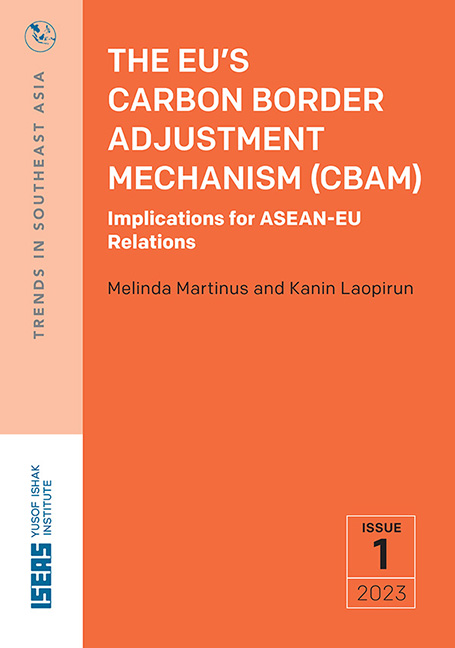The EU’s Carbon Border Adjustment Mechanism (CBAM): Implications for ASEAN-EU Relations
Published online by Cambridge University Press: 09 January 2024
Summary
INTRODUCTION
According to international frameworks, climate solutions need to be scaled up in critical international trade issues to fulfil the United Nations Sustainable Development Goals’ (UNSDG) goal 13, the 2015 Paris Agreement, and the decisions taken in the 2021 United Nations Climate Change Conference (COP 26) and the subsequent conference in 2022 (COP 27).
The European Union (EU) and the Association of Southeast Asian Nations (ASEAN) are the two most successful regional blocs, and trade relations between the two are currently on an upswing trajectory. However, the EU’s current plan to impose a Carbon Border Adjustment Mechanism (CBAM) as part of the EU Green Deal will likely cause disputes with global partners, including ASEAN.
This paper analyses the EU CBAM and its technical implementation and, most importantly, the possible implications of the EU CBAM on ASEAN-EU strategic relations. Through literature reviews and interviews with expert partners, this paper attempts to capture the regional perceptions and possible calibrated scenarios of implementing the EU CBAM in the ASEAN region.
Section 1 explains the rationale behind EU CBAM, and its technical aspects, providing the nuanced perspectives of those who support and those who disapprove of its implementation, so as to give readers a balanced view of the issue. Section 2 looks closely at the strategic implications of the EU CBAM to ASEAN-EU relations and discusses ASEAN’s receptiveness to such a policy. Section 3 concludes with possible future scenarios to be explored by the EU and ASEAN for adaptation to the EU CBAM.
SECTION 1: ABOUT THE EU CBAM
As part of its flagship Green Deal policy launched in 2021, the European Union introduced a Carbon Border Adjustment Mechanism (CBAM). If it fully takes off, the EU CBAM will impose a carbon price on certain imports, such as electricity, aluminium, cement, iron and steel, and fertilizer, into the EU region.
The CBAM aims to strengthen global climate change actions, and is much aligned with the EU’s current unwavering commitment to the UN Paris Agreement on climate change. Under the Paris Pledge, countries worldwide are fully committed to limiting global warming to well below 2 degrees Celsius and preferably to 1.5 degrees Celsius.
- Type
- Chapter
- Information
- The EU's Carbon Border Adjustment Mechanism (CBAM)Implications for ASEAN-EU Relations, pp. 1 - 29Publisher: ISEAS–Yusof Ishak InstitutePrint publication year: 2023

